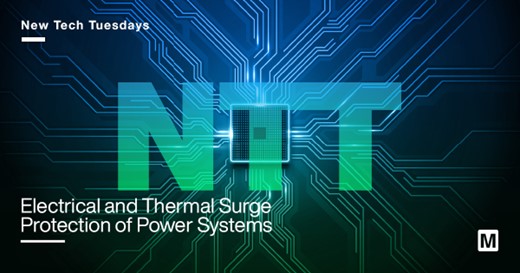
Brought to you by Mouser Electronics
Electrical and Thermal Surge Protection of Power Systems

March 16, 2024 in Circuit Protection
By Rudy Ramos, Technical Content Specialist at Mouser Electronics
 (Photo: Mouser Electronics Marketing Design)
(Photo: Mouser Electronics Marketing Design) New Tech Tuesdays
Join Rudy Ramos for a weekly look at all things interesting, new, and noteworthy for design engineers.
Imagine you have been working diligently on a marketing campaign presentation for weeks and have saved all your slides, documents, and spreadsheets to your portable Solid-State Drive (SSD). You get ready to start your presentation, plug in your SSD, and realize that your laptop fails to recognize it. The initial reaction is panic, and you quickly unplug and replug the drive, but nothing changes. Your laptop still does not recognize the drive. The cause for this catastrophic event (from your perspective) could be many, one of which could be damage to the SSD due to an over-current or over-voltage event. The result is that you have now lost all your hard work and valuable data and information due to potentially inadequate circuit protection.
What Is Circuit Protection?
Circuit protection refers to the use of devices or systems to protect electrical circuits and equipment from damage due to over-current, over-voltage, or other abnormal electrical or thermal conditions. These circuit protection devices include fuses, circuit breakers, electrostatic discharge (ESD) and surge suppressors, TVS diodes, thermal cutoffs, thermistors, thyristors, varistors, and other devices designed to open or interrupt the circuit in the event of a power overload.
Why Is Circuit Protection Important?
Circuit protection is important for many reasons, but safety is the most important. Circuit protection helps prevent electrical fires and other hazards that can result from electrical faults. Without proper circuit protection, electrical faults can also cause extensive damage to equipment and facilities, resulting in costly repairs and downtime. When implemented correctly, circuit protection devices like those mentioned ensure the reliability of electrical circuits, devices, or systems and prevent premature failures due to overloads, short circuits, input voltage surges, and excessive inrush currents.
In this week’s New Tech Tuesday, we will explore the critical role eFuse Protection ICs from Littelfuse play in providing robust over-voltage, over-current, and over-temperature protection to downstream circuits.
LS1205ExD33 Series
The Littelfuse LS1205ExD33 Protection eFuse ICs are integrated load switches that provide circuit protection when powering up a system. These devices have a wide input voltage range from 2.7V to 18V, require very few external components, and offer multiple protection modes. Littelfuse’s eFuse ICs are a robust defense against overloads, short circuits, input voltage surges, and excessive inrush currents. A programmable soft-start controls the slew rate of the output voltage to limit the inrush current during plug in. The LS1205ExD33 eFuse ICs integrate a temperature sensor for thermal shutdown protection and auto recovery. These circuit protection devices are available in a low profile, 10 leads, DFN 3mm x 3mm package.
Tuesday’s Takeaway
Circuit protection is a crucial aspect of electrical circuit design. Design engineers employ devices such as Littelfuse LS1205ExD33 eFuse ICs to safeguard equipment and facilities from electrical faults, which can result in costly repairs and downtime.
About the Author

Rudy is a member of the Technical Content Marketing team at Mouser Electronics, bringing 35+ years of expertise in advanced electromechanical systems, robotics, pneumatics, vacuum systems, high voltage, semiconductor manufacturing, military hardware, and project management. As a technology subject matter expert, Rudy supports global marketing efforts through his extensive product knowledge and by creating and editing technical content for Mouser’s website. Rudy has authored technical articles appearing in engineering websites and holds a BS in Technical Management and an MBA with a concentration in Project Management. Prior to Mouser, Rudy worked for National Semiconductor and Texas Instruments.
Advertisement
- Reliable connections for IIoT devices: Using simulation and measurement to optimize signal integrity
